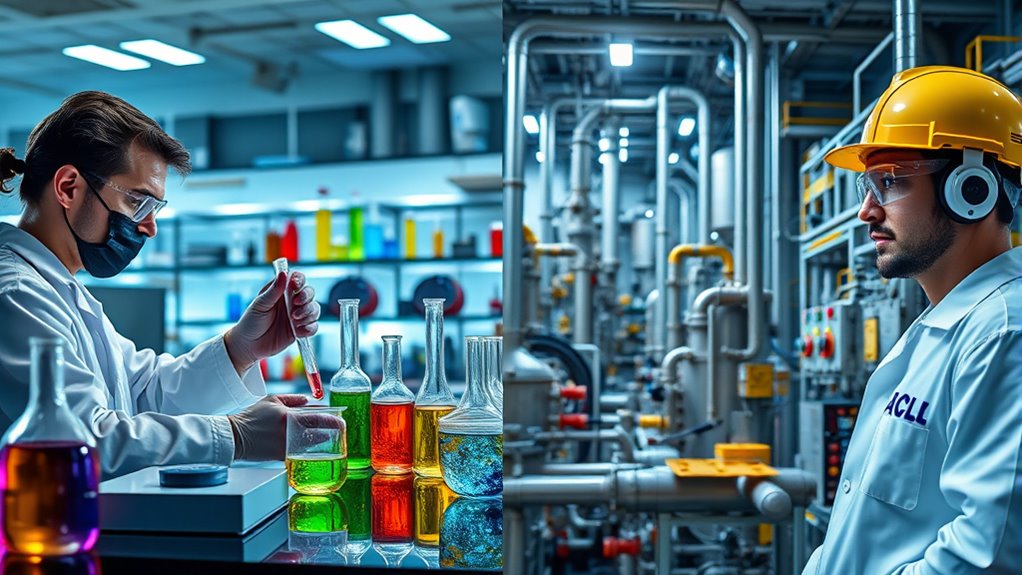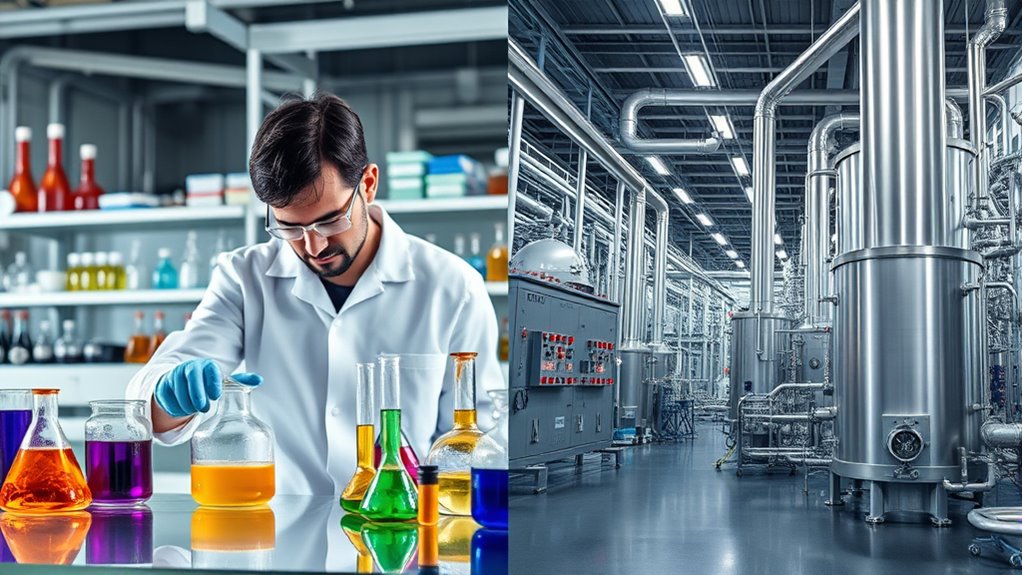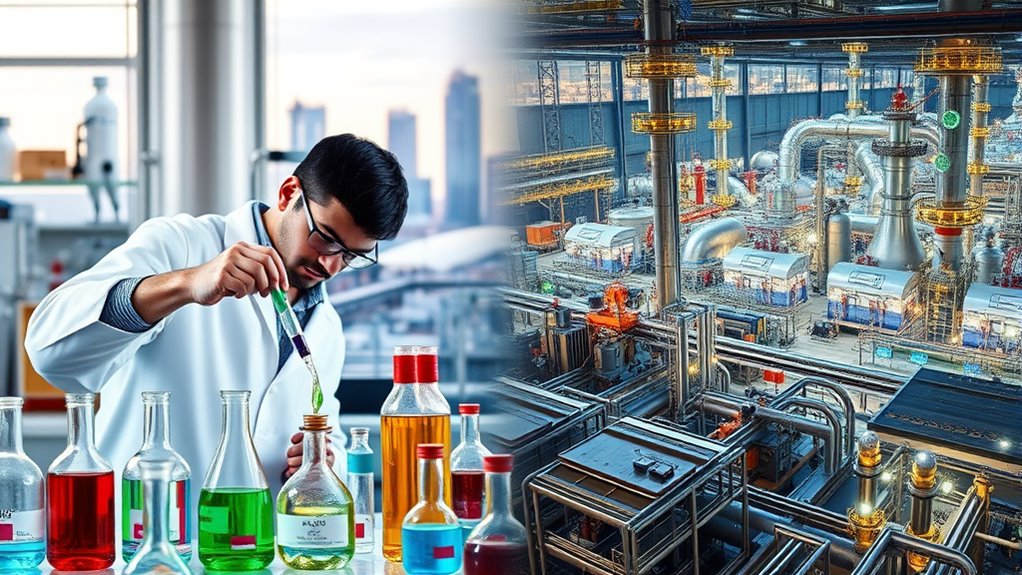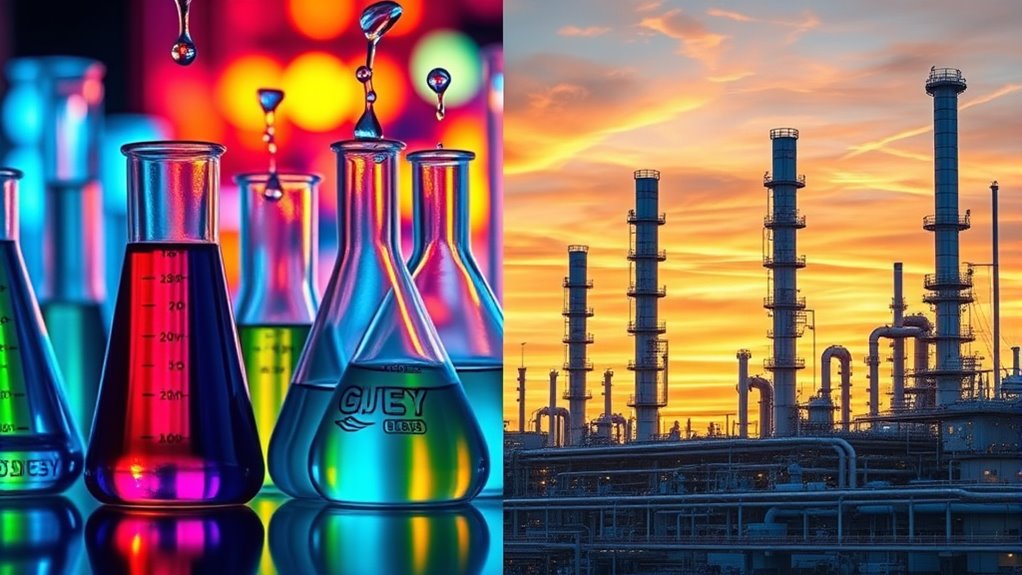If you’re deciding between chemistry and chemical engineering, consider whether you prefer doing research, understanding materials at a molecular level, and working in labs—this points to chemistry. Or, if you enjoy applying scientific principles to design and optimize industrial processes, chemical engineering might suit you better. Both fields offer impactful careers, but your choice shapes your daily work and future opportunities. To explore the differences and find the best fit, keep exploring what each path involves.
Key Takeaways
- Choose chemistry for a focus on research, laboratory work, and developing new materials; opt for chemical engineering for process design and industrial applications.
- Chemistry emphasizes theoretical understanding and experimentation; chemical engineering prioritizes applying science to optimize manufacturing and large-scale processes.
- Chemists work mainly in labs and research settings; chemical engineers often operate in factories, plants, and process industries.
- If interested in creating new substances or understanding molecular interactions, pursue chemistry; if solving real-world problems through process innovation, choose engineering.
- Career paths differ: chemistry leads to academia, research, and analysis; chemical engineering offers roles in process design, operations, and sustainability initiatives.
Differences in Academic Focus and Curriculum

Chemistry and chemical engineering differ considerably in their academic focus and curriculum. Chemistry centers on understanding the composition, structure, and reactions of substances, covering core subjects like organic, inorganic, analytical, physical, and biochemistry. It’s a more theoretical field, emphasizing research and discovering new knowledge about materials. Chemistry education often involves laboratory work that develops skills in analyzing substances at the molecular level. On the other hand, chemical engineering applies engineering principles to solve practical problems in manufacturing and industry. Its curriculum includes thermodynamics, fluid dynamics, heat and mass transfer, and process design, emphasizing real-world application. Chemical engineering integrates physics, math, and biology but remains focused on designing efficient industrial processes. While chemistry dives deep into the properties of materials, chemical engineering broadens its scope across industries, aiming to optimize production and solve engineering challenges. A key aspect of process optimization involves understanding how different variables affect industrial outcomes, which is central to chemical engineering.
Career Opportunities and Work Environments

Both chemistry and chemical engineering open diverse career paths and work environments. As a chemist, you might work in laboratories, hospitals, or universities, focusing on analysis, research, or teaching. You could find yourself in pharmaceutical companies, biotech firms, or environmental agencies, contributing to drug development, genetic engineering, or pollutant analysis. Many chemists pursue postgraduate studies or shift into fields like patent law or science communication. Chemists often work in academic and research institutions, where they focus on developing new theories and conducting experiments. Chemical engineers primarily work in industrial settings such as manufacturing plants, refineries, or energy facilities, where they design, operate, and optimize processes. They often split their time between on-site field visits and office-based planning. Both careers offer varied environments, but chemists lean toward research and analysis, while engineers focus on practical application and process management. Additionally, understanding the role of process optimization can be crucial for chemical engineers seeking to improve efficiency and safety in industrial processes.
Industry Applications and Societal Impact

Industry applications of chemistry and chemical engineering are essential to modern society, each playing a distinct role in advancing technology and sustainability. Chemistry focuses on understanding materials, analyzing pollutants, and developing new compounds, directly impacting health, food safety, and environmental protection. Chemists contribute to developing new medicines and improving food safety standards. Chemical engineering, on the other hand, scales up processes for mass production, optimizing resource use, and creating sustainable solutions like renewable fuels and wastewater treatment. In manufacturing, both fields contribute—chemistry through material properties, chemical engineering through process efficiency. Their societal impacts include improving public health via drug development, supporting sustainable development with eco-friendly processes, and conserving resources through innovative materials and methods. Furthermore, regulatory compliance is crucial in both disciplines to ensure safety and environmental standards are met. Together, they drive technological progress and address global challenges, shaping a safer, cleaner, and more sustainable future.
Skills and Knowledge Required for Success

To succeed in chemistry and chemical engineering, you need a strong foundation in relevant knowledge and practical skills.
As a chemist, you’ll focus on mastering organic, inorganic, physical, and analytical chemistry, along with laboratory techniques and experimental design. Understanding the properties and interactions of matter is fundamental to developing new substances and applications. Developing a precise understanding of chemical reactions and mechanisms is essential for innovation in the field. Chemical engineers, meanwhile, combine chemistry with engineering principles like thermodynamics, fluid mechanics, and materials science, applying math and physics to design scalable processes.
Both fields demand strong analytical and problem-solving skills—chemists excel in hypothesis testing and precise measurements, while chemical engineers use modeling and simulation for process optimization.
Technical competencies in laboratory techniques are essential for chemists, and process simulation tools are crucial for engineers.
Success also requires project management, systems integration, and an understanding of safety, ethics, and environmental impacts. Furthermore, staying updated with emerging technologies can greatly enhance your career prospects in either discipline.
Choosing the Right Path for Your Future

Deciding between a career in chemistry or chemical engineering depends on your interests and strengths.
If you enjoy research, experimentation, and working in labs, chemistry might be your path. It’s ideal if you’re passionate about understanding reactions at a microscopic level and pursuing roles in pharmaceuticals, environmental science, or academia. Chemists create new materials and analyze reaction mechanisms, which allows for a deep exploration of chemical fundamentals. Additionally, chemistry careers often involve a strong foundation in scientific principles that can lead to diverse research opportunities.
On the other hand, if you prefer applying scientific principles to solve real-world problems, designing processes, and working in industrial settings, chemical engineering suits you better. Engineering careers often involve collaboration on large projects, process optimization, and safety management. The process design and operations aspect of chemical engineering emphasizes practical skills and application of theory in manufacturing and industry.
Consider your educational preferences too—chemistry leans toward theoretical work, while engineering emphasizes process design and operations.
Your choice should align with your passion for either research or practical application, shaping your future career satisfaction and growth.
Frequently Asked Questions
What Are the Typical Salaries for Chemists Versus Chemical Engineers?
You’re curious about the typical salaries for chemists and chemical engineers. Chemists earn around $79,430 annually in the U.S., while chemical engineers make about $105,550, reflecting their roles in larger-scale industrial operations.
Starting salaries are also higher for chemical engineers, often around $67,800, compared to chemists’ lower entry-level pay. As you gain experience, chemical engineers tend to see greater salary growth due to their broader responsibilities.
How Do Internships Differ Between Chemistry and Chemical Engineering Students?
When you look at internship differences, it’s clear they’re worlds apart but both offer valuable experience. As a chemistry intern, you’ll immerse yourself in lab research, focusing on experiments, analysis, and discovery.
Meanwhile, a chemical engineering internship puts you in industrial settings, working on process design, scale-up, and optimization. Think of it as the difference between tinkering in a lab and running the show on a factory floor.
What Are the Emerging Fields or Specializations in Each Discipline?
You should explore emerging fields in both disciplines. In chemistry, focus on green chemistry, nanotechnology, pharmaceuticals, and energy storage, where innovations aim to address environmental and health challenges.
In chemical engineering, look into process optimization, AI integration, bioprocessing, and hydrogen economy systems, which drive sustainable industrial practices.
Both areas offer dynamic, impactful specializations that can shape future technologies and solutions.
How Important Are Research Publications in Advancing Careers in Both Fields?
Research publications are the rocket fuel that propels your career in both fields, making your expertise visible and opening doors to new opportunities.
In chemistry, they’re essential for securing grants, academic positions, and recognition, often defining your professional stature. Chemical engineering values industry-focused research, but publications still boost your credibility, especially if you aim for leadership or academic roles.
Consistent publishing builds your reputation and accelerates career growth dramatically.
What Professional Certifications or Licenses Are Relevant for Each Profession?
You should consider professional certifications relevant to your career goals. Certifications like Certified Professional Chemist (CPC) or Approved Chemist are valuable for chemists.
Chemical engineers might pursue the Certified Chemical Engineer (CCE) or Certified Quality Auditor (CQA). Some certifications, such as CPC or CQA, are applicable to both fields.
Keep in mind, maintaining these credentials often requires continuing education, so stay updated to enhance your professional credibility and opportunities.
Conclusion
Ultimately, choosing between chemistry and chemical engineering depends on your interests and goals. If you enjoy scientific discovery, a chemistry degree offers deep research opportunities. Want to solve real-world problems and work in manufacturing? Chemical engineering might be your path. Notably, the Bureau of Labor Statistics reports that chemical engineering jobs are projected to grow 4% from 2021 to 2031, highlighting strong future demand. Whichever path you pick, aligning it with your passions will set you up for success.









